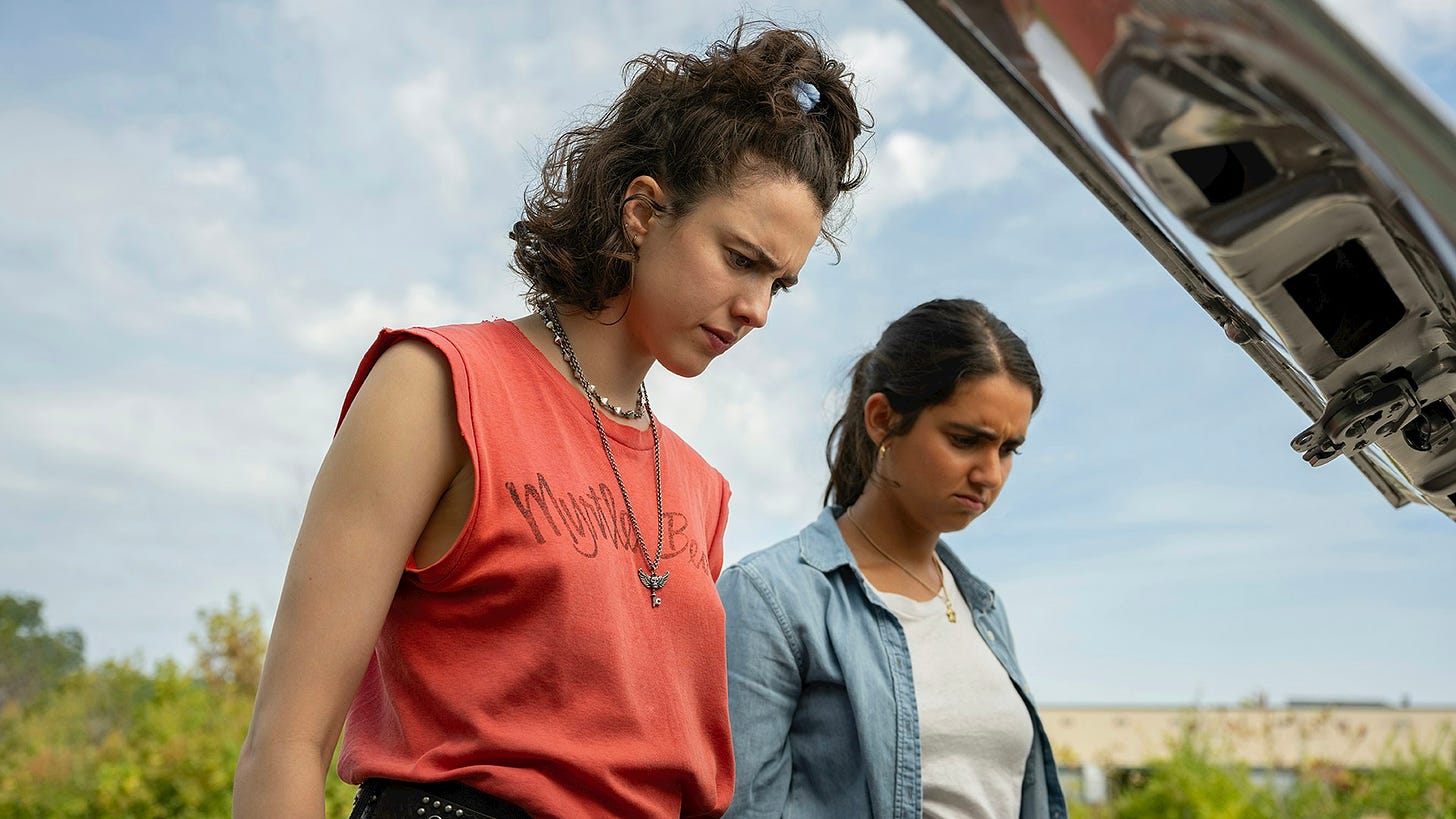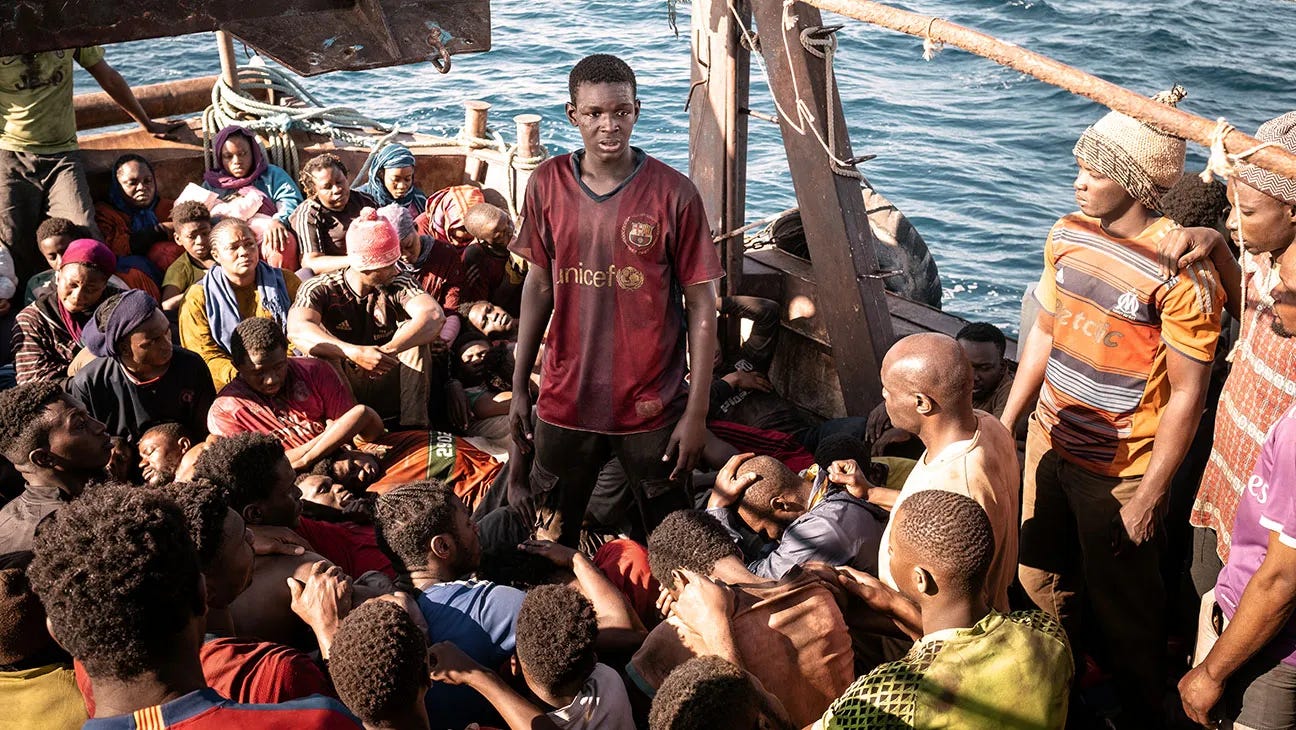In Review: 'Drive-Away Dolls,' 'Io Capitano'
Ethan Coen delivers a memorable solo outing while the director of 'Gomorrah' steps out of his comfort zone with an Oscar-nominated immigrant drama.
Drive-Away Dolls
Dir. Ethan Coen
83 min.
As Drive-Away Dolls opens, longtime friends Jamie (Margaret Qualley) and Marian (Geraldine Viswanathan) know their places. Jamie likes to hop on the stage and whoop it up as she tells patrons of their favorite lesbian bar the locations of the next round of body shots and in what order they will be taken. Marian doesn’t do any of that. Mostly she just watches as Jamie turns everywhere she goes into a party, openly cheats on her hot-tempered cop girlfriend Sukie (Beanie Feldstein), and otherwise lives spontaneously. But, for some reason, it works, or works well enough to keep the two in each others’ orbit, and even embark on a spontaneous road trip to Tallahassee after taking a gig at a car service looking for drivers to take vehicles from one city to the next. When they, eventually, realize that they’ve gotten behind the wheel of the wrong car carrying a valuable (and strange) payload, their relationship gets thrown out of balance. Everything goes wrong, but maybe that’s what it takes for everything to go right.
Co-written by Ethan Coen and wife Tricia Cooke, Coen’s first narrative feature as a solo director (a follow-up to the documentary Jerry Lee Lewis: Trouble in Mind), Drive-Away Dolls is a shaggy, uneven, but consistently likable road movie that, in spite of its noir shading and occasional outbursts of comically graphic violence, is far more concerned with the central characters and the stops they make along the way than any danger they might be in. That Qualley and Viswanathan give such charismatic performances helps quite a bit, Qualley laying on the honeyed Texas accent thick and Viswanathan subtly conveying a lot of unspoken feelings simply by the way she looks up from her copy of a Henry James novel when Jamie brings a one-night stand back to their shared hotel room. (There’s a love story at the heart of the movie that takes at least one of the protagonists by surprise.)
It might not be fair to compare Coen’s first non-documentary solo venture to his work with his brother Joel but it’s also kind of inevitable. Drive-Away Dolls looks more stylized (courtesy of Power of the Dog and Eileen cinematographer Ari Wegner) and has a much looser structure (though the early appearance of a wall-mounted dildo does turn out to be a bit of foreshadowing) than the Coens’ joint efforts. The film plays like the cinematic equivalent of a solo album in which a band member finally gets to cut loose and not answer to anyone else while paying tribute to some key influences. (Drive-Away Dolls’ many homages include nods to Kiss Me Deadly and Some Like it Hot.) And, as such albums often do, it often stirs up memories of past joint efforts.
Mostly that’s not to the film’s detriment. The cast takes obvious pleasure in Coen and Cooke’s stylized dialogue and Colman Domingo, Matt Damon, C.J. Wilson, and Joey Slotnick—the latter two playing a team of sparring henchmen—provide a lot of color as the supporting cast of memorable eccentrics. Yet there’s a not-quite-thereness to much of the film that’s hard to ignore despite its winning qualities. Some of the gags land brilliantly. (Bill Camp’s car service operator “Curlie” almost demands a movie of his own.) Others just kind of sit there. Yet ultimately the spirit of the film—its irreverence, heartfelt romance, and unabashed horniness—wins out. Drive-Away Dolls sometimes takes a bumpy road, but it ultimately gets where it needs to go. —Keith Phipps
Drive-Away Dolls opens everywhere tomorrow.
Io Capitano
Dir. Matteo Garrone
121 min.
The journey from Dakar, Senegal to the Sicilian coast is around 3,500 miles up the northwestern coast of Africa and across the Mediterranean from Tunisia, but it’s significantly longer for Seydou (Seydou Sarr) and Moussa (Moustapha Fall), the Senegalese teenagers who attempt to migrate to Italy in Matteo Garrone’s Oscar-nominated Io Capitano. They do not have the luxury of planes, trains, or automobiles, and their terrible adventure takes them east through Niger and north through the Sahara Desert, where they court starvation and dehydration in the heat before things really get bad for them. In all the stories we hear about 21st century migration, stoked by climate change and political unrest, there’s never enough emphasis on the mortal risks people take for a better life—one that itself is far from guaranteed, even if they reach their destination.
As an Italian attempting to plug into the experiences of African boys, Garrone takes his own kind of risk in making a film like Io Capitano, which is not only limited by his perspective, but by his approach, too. He wants to give viewers a visceral sense of how young men like Seydou and Moussa can make it through such a nightmarish gauntlet of hardship and exploitation. But he also courts the possibility of a victimization narrative where they’re knowable only by the torments they suffer. Though Io Capitano isn’t particularly rich as a character study, Matteo does enough to redeem the film by focusing on Seydou and making it a coming-of-age story where a naive, empathetic boy undergoes a powerful transformation.
Driven by equal parts poverty and ambition, Seydou and Moussa dream of taking their lyrical talents to Europe, but Seydou wants to send money back to his family, who barely have a roof over their heads. The boys have been saving for months, but not long after they hop on a bus out of Dakar, they’re squeezed for black market expenses, like expensive fake passports to get them over the Niger border and a dodgy service to escort them through the Sahara into Libya. There’s also the threat of armed thugs who will torture and jail them indefinitely if they can’t summon a ransom money. If they happen to survive that, then they get sold into slavery. And if they survive that, there’s still the matter of paying for transport on a rickety boat across the Mediterranean, courting the possibility of engine failure or extreme weather before getting a hostile reception on the other side.
Garrone is a gifted director, and there are shades of his superb 2008 gangster film Gomorrah in Seydou’s encounter with human traffickers who have organized a vile business out of snatching migrants in the desert and shaking them down. Il Capitano adds a note of hallucinatory fantasy that’s mostly out of place, perhaps in a bid to give some shred of hope to a story defined by a succession of miseries. But the film has a tremendous scope and beauty that gives the migrants’ journey the sweep of an epic, led by a character who grows into the role of a battle-tested hero. And the ending is the perfect question mark: We can’t know what the future holds, immediate or long-term, for these adventurers, but we do learn how they’re doing to face it. — Scott Tobias
Io Capitano opens in limited release tomorrow.









Will no one save Curlie?
"though the early appearance of a wall-mounted dildo does turn out to be a bit of foreshadowing"
the classic Chekhov's dildo